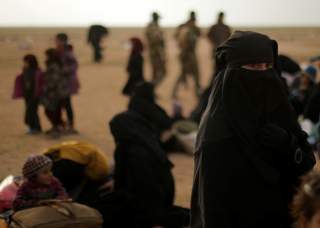Will Washington's Syria Policy Fail?
U.S. allies in the Kurdistan region want U.S. forces to remain in the country to prevent an Islamic State resurgence.
The next two months will be a major crossroads for U.S. policy. A major phase of the Islamic State war is ending. It has been a successful war, with low U.S. casualties and most of its goals accomplished. However Washington has eschewed articulating clear goals in the next phase. “Stabilization” is an open-ended term which was used to describe U.S. operation in Syria, up until the point that the Trump administration decided to wrap up those operations.
In Iraq the administration has said it wants to “watch” Iran. Like in Syria, where the anti-Islamic State campaign had no addendum to counter Iran, the agreement with Baghdad has no addendum to include using Iraq to watch Iran’s activities. This could be a stumbling block for U.S. policy in Iraq, even as U.S. allies in the Kurdistan region stress the need for U.S. forces to remain to prevent an Islamic State resurgence. Iran and its local allies, sensing that the United States is faltering in Syria, may try to push against another pillar of U.S. policy in Iraq.
The anti-ISIS coalition meeting in Washington and the Warsaw summit provided Washington an opportunity to articulate its next steps in the Middle East. But neither meeting produced concrete objectives. For instance, Pompeo’s assertion that Iran’s support for Hezbollah, the Houthis and Hamas is a threat faces doesn’t come with clear steps to isolate each group. The House of Representatives voted to end U.S. support for the Saudi-led Yemen conflict where the Houthi rebels are located. Iran’s foreign minister Javad Zarif went to Lebanon on the eve of the Warsaw Summit to showcase Lebanon-Iran relations, and Turkey sat down with Iranian and Russian leaders as the United States gathered allies in Warsaw. These are symbolic setbacks for the U.S.-Iran policy at a time when the anti-Islamic State policy in Iraq and Syria also faces key hurdles to get to its next phase. If the administration doesn’t find a way to capitalize on the important February meetings, then the opportunity may have been squandered.
Seth J. Frantzman is a Jerusalem-based journalist who holds a Ph.D. from the Hebrew University of Jerusalem. He is the executive director of the Middle East Center for Reporting and Analysis and a writing fellow at Middle East Forum. He is the author of 'After ISIS: America, Iran and the new Middle East' (forthcoming Gefen Publishing). Follow him on Twitter at @sfrantzman .
Image: Reuters

